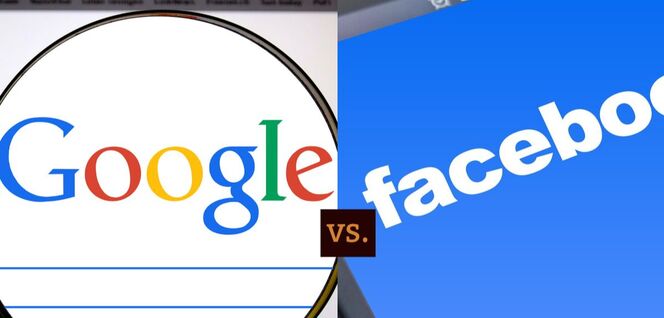|
When it comes to online advertising, it doesn't get any bigger than the two tech giants Google and Facebook. But, which one is best for advertising your business? The aim of this blog post is to discuss the pros and cons of using Facebook Ads and Google Ads (previously Google Adwords). We won't be discussing the in-depth details of the various ways you can advertise on the two platforms. Facebook Ads or Google Ads?While both platforms allow you to advertise on third party websites as sponsored ads, Google stands out in one important way - Google search. Adverts created with Facebook that appear on Facebook, Instagram and other sites can be considered to some extent as 'speculative'. Yes, you can define your target audience including their interests, their age, location etc but someone seeing the advert is less likely to be in 'buying mode'. A seller of training equipment for playing hockey might be able to target people such as 'anyone who lives within 25 miles of New York, has an interest in hockey and is aged 25-44' but that doesn't mean that person who sees the advert is interested in, or wants to buy what's on offer. They might not play hockey and only have an interest in watching it. With Google, you appear when people are actively searching for what you sell. Using the above example, a person who wants to buy a hockey stick has already made a conscious decision to find out more about the various types or is ready to buy. They are already further into the decision making sales process and are likely to search specifically for 'hockey sticks' or 'buy hockey stick'. This means you are appearing to people who are genuinely interested and are closer to buying. With Facebook you might need to reach out to more people to generate sales. That doesn't mean Facebook isn't worth considering. Is Google Ads better than Facebook Ads?Set up correctly, Google Ads can be highly effective but that doesn't make it an outright winner compared to Facebook Ads.
Facebook Ads has many advantages. It tends to be lower cost pay per click, it has access to an audience that's in the billions and there's the opportunity to educate people who may don't think they need your product... but they do. Facebook Ads, like Google, also allows you to do re-targeting so that your ad will appear when you have visited a similar website - although recent privacy changes by Apple have made this harder. If you had to decide which platform to use then it will depend on your budget, objectives and industry you are in. You may, for example, have the objective to raise awareness of your new product during a product launch and decide that Facebook is best for that. Facebook is also great for short-term promotions, allowing you to reach a lot of people in a short period of time. If you would like to know more about Google then consider our online course Getting to to the top of Google. This course covers Google Ads as well as SEO (getting found on Google without spending money on adverts). Personally, I prefer Google but that doesn't mean it will always be the right solution for your business. Consider your objectives and what you want to achieve before making a decision. You may want to use both platforms to be more effective. If you need help with online advertising, contact Think Twice Marketing.
0 Comments
To be clear, I'm not endorsing launching poor products to grow sales and this story isn't about any product Think Twice Marketing has launched! I'm a great fan of reading books that help to understand and develop marketing as well as around personal development and this story is from a book titled Predictably Irrational by Dan Ariely.
The story is about a company that launched a breadmaker which, at the time, was a relatively new concept. When Williams-Sonoma first launched their breadmaker for $275, sales were poor and despite their best marketing efforts, consumers didn’t get the concept of making bread at home and found it even harder to understand why they should pay $275 for such a device. Williams-Sonoma needed a plan B. More thought into improving the solution, it seemed was needed. So what did Sonoma do? They launched a larger, heavier and less attractive breadmaker at a 50% premium to the original version (although at the time it was considered to have more features the new breadmaker couldn't really be justified at a 50% premium). What happened was unexpected. Sales started to grow rapidly - but not for the premium priced product, it was for the original machine priced at $275. Why had this happened? The answer, it seems is - in one word - relativity. This is less about Einstein and more about how people compare your solutions relative to each other, relative to the competition and relative to the idea of not purchasing anything at all. On its own, the $275 bread maker had nothing to compare against. Possibly a cheaper coffee maker or some other kitchen appliance? Or maybe the idea of keeping $275 in your pocket? Once the new bread maker was launched consumers were saying “wow, this bread maker is much better value for money and is smaller, I think I’ll take that one” rather than “a bread maker? Not sure why I want to pay over $200 for that!”. The conversation in their mind had shifted from whether to buy at all to which one should I buy. Relativity plays a big role in marketing and decision making. If you are looking to launch a poorer or inferior product or service we can't help but If you would like to learn more about how relativity can be used to improve your marketing activities and grow your sale then my book 'Psychology in Marketing and Sales' is a recommended read. Head over to the Resources page to find out more. Don't underestimate the power of headlines in your marketing. Make sure not to lose out on potential customers with this blog post about the importance of titles or heading in marketing campaigns! How important is a title or heading in a marketing campaign?How much time do you spend on the wording for your title? Whether it's email marketing, blog writing or any other form of marketing where a title or heading is required many marketers and business owners underestimate the importance of the title. Consider this...
At some point in the past you may have written a blog post or an email to send out to your distribution list and very quickly added the title. If you have then you aren't alone but it's one of the worst things you can do. If the title doesn't capture the attention of the reader then they aren't going to read the rest of the content. In today's world, we are busy people; constantly bombarded with information such as emails, notifications and bits of information we see around us such as ads on the TV or people talking. When it comes to grabbing the readers attention, your campaign is just one of many activities trying to grab and maintain their attention. If you haven't succeeded then those previous minutes or hours you have spent writing the body of the content is wasted. The content won't get read. The purpose of a title? The purpose of the title is to tell the reader what the main content is about, right? Actually this is only part of the answer. More importantly, the purpose is to grab the readers attention and make them want to read more. If you fail in the last part then the marketing campaign will be less effective. In email marketing, typically less than 30% of subscribers will open an email, fewer will read more than the first couple of lines and even fewer will read the whole email. The subject heading should entice the reader to open the email. The email title should entice the reader to want to read the main content and the first few lines of content should entice the reader to want to read the rest. The same principle applies for blog posts. An accountant, for example, might write a newsletter which includes 3 great tips for reducing the tax a business has to pay. When the email arrives in your inbox and you see the title, which one of these are you, as a business owner likely to open? Summer Newsletter 2019 or 3 Proven Ways To Pay Less Tax In Your Business The sight of the word 'newsletter' makes me want to immediately delete the email or at best, leave it in my inbox to read later (which in reality I will never come back to). Time well spent I've seen an argument for spending more time on the title of a blog post or email campaign than on the rest of the content. I'm not convinced by this as some campaigns can take hours to write and spending several hours deciding on a title doesn't make sense. Without doubt, an effective, well written title is crucial - and arguably more important than the main body of content but with experience it shouldn't take that long to come up with a powerful headline. Just spending 10-15 minutes playing around with different wording may be enough time to find the perfect headline. Here are some headlines types to consider: - Ask a question that will get the reader thinking and prompt them to read further such as 'Are you struggling to find time to get fit' (if you are a personal fitness instructor reaching out to your audience). - Start with 'How to' or 'Discover why' so the reader is clear that the content will explain the answer. - Make a single bold statement that the reader wants to find out more about. This style is more inline with newspapers who often do headlines such as 'Boy saves lives' or 'Millions suffering'... you get the idea. The use of power words are also important and this is discussed in my book 'How to create a successful email marketing campaign'. One element we haven't discussed in this blog is the importance of effective headings in blog posts from an SEO perspective. Titles should include keywords that are used as part of an SEO campaign to get to the top of Google. You can find out more about this in my blog post How to SEO Your Blog Posts. If you would like more help writing your marketing campaigns including writing effective titles then contact Think Twice Marketing. |
written byThe opinions in these blog posts are those of marketing expert and book author Darren Hignett. Categories
All
Archives
October 2022
|
|
Open 9 am - 5 pm
Tel: 07769 331 247 |




 RSS Feed
RSS Feed